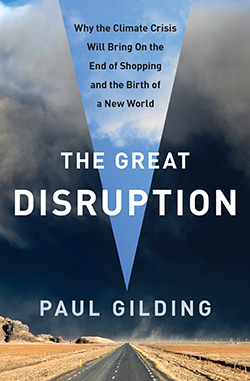
"The Great Disruption"
By Paul Gilding
Bloomsberry Press
http://paulgilding.com/the-great-disruption/
The Great Disruption offers a stark and unflinching look at the challenge humanity faces-yet also a deeply optimistic message. The coming decades will see loss, suffering, and conflict as our planetary overdraft is paid; however, they will also bring out the best humanity can offer: compassion, innovation, resilience, and adaptability. Gilding tells us how to fight-and win-what he calls The One Degree War to prevent catastrophic warming of the earth, and how to start today.
"The Great Disruption: How humankind can thrive in the 21st Century", The Royal Society of Arts
http://www.youtube.com/watch?v=tsXID1kSuf4
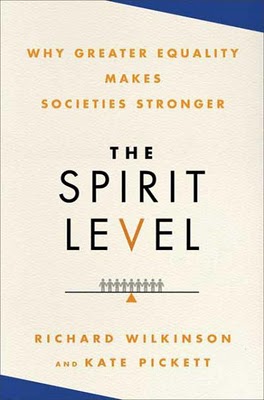
"The Spirit Level"
By Richard Wilkinson and Kate Pickett
Bloomsberry Press
https://www.equalitytrust.org.uk/resources/the-spirit-level
Written by Kate Pickett and Richard Wilkinson, the book highlights the "pernicious effects that inequality has on societies: eroding trust, increasing anxiety and illness, (and) encouraging excessive consumption". It shows that for each of eleven different health and social problems: physical health, mental health, drug abuse, education, imprisonment, obesity, social mobility, trust and community life, violence, teenage pregnancies, and child well-being, outcomes are significantly worse in more unequal rich countries.
"Building More Equitable Societies", talk by Kate Pickett and Richard Wilkinson, University of Washington School of Public Health
https://www.youtube.com/watch?v=pXwJI1d2kNw
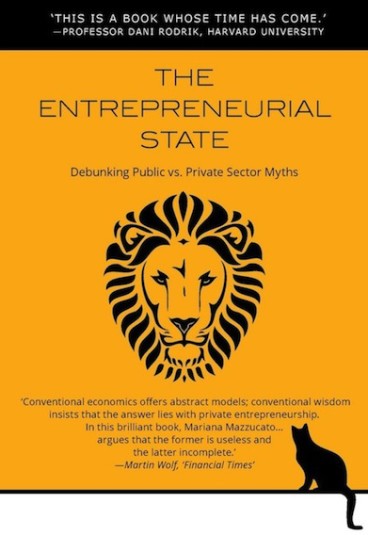
"The Entrepreneurial State"
By Marianna Mazzucato
Public Affairs
http://marianamazzucato.com/the-entrepreneurial-state/
The book comprehensively debunks the myth of a lumbering, bureaucratic state versus a dynamic, innovative private sector. In a series of case studies—from IT, biotech, nanotech to today’s emerging green tech—Professor Mazzucato shows that the opposite is true: the private sector only finds the courage to invest after an entrepreneurial state has made the high-risk investments. In an intensely researched chapter, she reveals that every technology that makes the iPhone so ‘smart’ was government funded: the Internet, GPS, its touch-screen display and the voice-activated Siri.
"Government - Investor, risk-taker, innovator", TED Talk by Marianna Mazzucato
https://www.ted.com/talks/mariana_mazzucato_government_investor_risk_taker_innovator#t-19413

"Utopia for Realists"
By Rutger Bregman
Back Bay Books
https://www.rutgerbregman.com/books
Every progressive milestone of civilization -- from the end of slavery to the beginning of democracy -- was once considered a utopian fantasy. Bregman's book, both challenging and bracing, demonstrates that new utopian ideas, like the elimination of poverty and the creation of the fifteen-hour workweek, can become a reality in our lifetime. Being unrealistic and unreasonable can in fact make the impossible inevitable, and it is the only way to build the ideal world.
"Poverty isn't a lack of character; it's a lack of cash", TED Talk by Rutger Bregman
https://www.youtube.com/watch?v=ydKcaIE6O1k
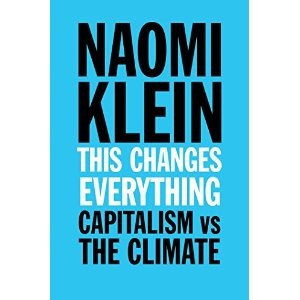
"This Changes Everything"
By Naomi Klein
Simon & Schuster
http://thischangeseverything.org/book/
“Written with an elegant blend of science, statistics, field reports and personal insight, it does not paralyze but buoys the reader. The book’s exploration of climate change from the perspective of how capitalism functions produces fresh insights and its examination of the interconnectedness between our relationship with nature and the creation of better, fairer societies presents a radical proposal. Klein’s urgency and outrage is balanced by meticulous documentation and passionate argument. Heart and mind go hand in hand in this magisterial response to a present crisis.” — Jury citation: Hilary Weston Writers’ Trust Prize for Nonfiction
Naomi Klein interview with Charlie Rose, PBS
https://charlierose.com/videos/23046
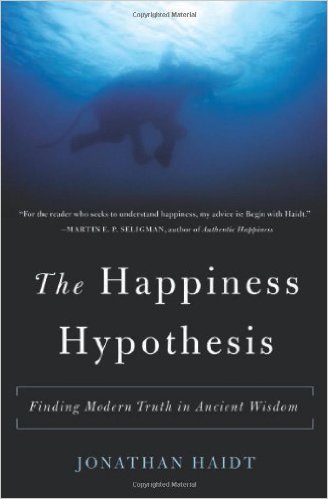
"The Happiness Hypothesis"
By Jonathan Haidt
Basic Books
http://www.happinesshypothesis.com
This is a book about ten Great Ideas. Each chapter is an attempt to savor one idea that has been discovered by several of the world’s civilizations - to question it in light of what we now know from scientific research, and to extract from it the lessons that still apply to our modern lives. It is a book about how to construct a life of virtue, happiness, fulfillment, and meaning. - Jonathan Haidt
"Can a Divided America Heal?", TED interview with Jonathan Haidt
https://www.ted.com/talks/jonathan_haidt_can_a_divided_america_heal#t-151256
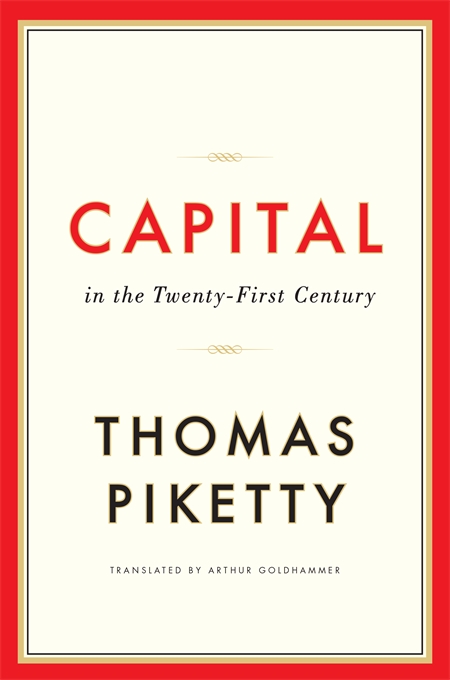
"Capital in the Twenty-First Century"
By Thomas Piketty
Belknap Press
http://piketty.pse.ens.fr/files/Piketty2014Capital21c.pdf
What are the grand dynamics that drive the accumulation and distribution of capital? Questions about the long-term evolution of inequality, the concentration of wealth, and the prospects for economic growth lie at the heart of political economy. But satisfactory answers have been hard to find for lack of adequate data and clear guiding theories. In Capital in the Twenty-First Century, Thomas Piketty analyzes a unique collection of data from twenty countries, ranging as far back as the eighteenth century, to uncover key economic and social patterns. His findings will transform debate and set the agenda for the next generation of thought about wealth and inequality. - Amazon.com
"New thoughts on capital in the twenty-first century", TED Talk by Thomas Piketty
https://www.youtube.com/watch?v=JKsHhXwqDqM
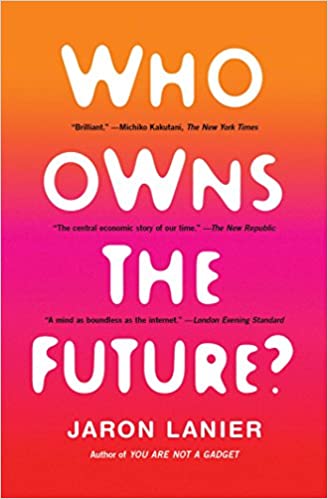
"Who Owns the Future?"
By Jaron Lanier
Simon & Schuster
https://www.simonandschuster.com/books/Who-Owns-the-Future/Jaron-Lanier/9781451654974
Jaron Lanier is the father of virtual reality and one of the world’s most brilliant thinkers. Who Owns the Future? is his visionary reckoning with the most urgent economic and social trend of our age: the poisonous concentration of money and power in our digital networks. Lanier has predicted how technology will transform our humanity for decades, and his insight has never been more urgently needed. He shows how Siren Servers, which exploit big data and the free sharing of information, led our economy into recession, imperiled personal privacy, and hollowed out the middle class. The networks that define our world—including social media, financial institutions, and intelligence agencies—now threaten to destroy it.
"How we need to remake the internet", TED Talk by Jaron Lanier
https://www.youtube.com/watch?v=qQ-PUXPVlos

"The Circle"
By Dave Eggers
Vintage Books
War is peace. Freedom is slavery. Ignorance is strength.
—George Orwell, “1984”
Secrets are lies. Sharing is Caring. Privacy is theft.
—Dave Eggers, “The Circle”
In the future, according to Dave Eggers, one mega social-network corporation, the namesake of his new novel, has become the technological architect of daily life—arranging conversations, restocking pantries, making payments, and ranking human beings.
"My Wish: Once Upon A School", TED Talk by Dave Eggers
https://www.ted.com/talks/dave_eggers_my_wish_once_upon_a_school
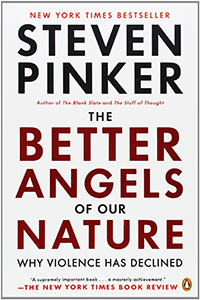
"The Better Angels of Our Nature"
By Steven Pinker
Penguin Books
http://stevenpinker.com/publications/better-angels-our-nature
In his gripping and controversial new work, New York Times bestselling author Steven Pinker shows that despite the ceaseless news about war, crime, and terrorism, violence has actually been in decline over long stretches of history. Exploding myths about humankind's inherent violence and the curse of modernity, this ambitious book continues Pinker's exploration of the essence of human nature, mixing psychology and history to provide a remarkable picture of an increasingly enlightened world.
"Is the World Getting Better or Worse?', TED Talk by Steven Pinker
https://www.ted.com/talks/steven_pinker_is_the_world_getting_better_or_worse_a_look_at_the_numbers
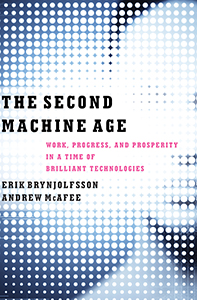
"The Second Machine Age"
By Erik Brynjolfsson and Andrew McAfee
W. W. Norton & Company
In The Second Machine Age MIT’s Erik Brynjolfsson and Andrew McAfee reveal the forces driving the reinvention of our lives and our economy. Amid this bounty will also be wrenching change. Recent economic indicators reflect this shift: fewer people are working, and wages are falling even as productivity and profits soar. Brynjolfsson and McAfee identify the best strategies for survival and offer a new path to prosperity. These include revamping education so that it prepares people for the next economy instead of the last one, designing new collaborations that pair brute processing power with human ingenuity, and embracing policies that make sense in a radically transformed landscape.
Race Against the Machine: Andrew McAfee at TEDxBoston
http://www.youtube.com/watch?v=QfMGyCk3XTw
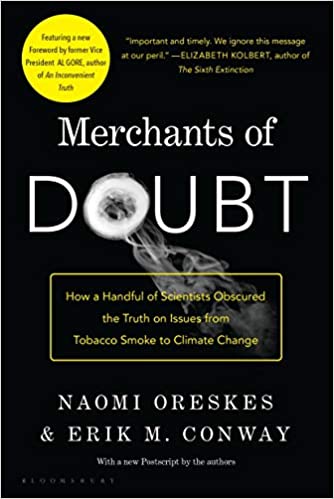
"Merchants of Doubt"
By Naomi Oreskes and Erik M. Conway
Bloomsbury Publishing
https://www.merchantsofdoubt.org
Merchants of Doubt has been praised—and attacked—around the world, for reasons easy to understand. This book tells the disquieting story of how a loose-knit group of high-level scientists and scientific advisers, with deep connections in politics and industry, ran effective campaigns to mislead the public and deny well-established scientific knowledge over four decades. The same individuals who claim the science of global warming is “not settled” have also denied the truth about studies linking smoking to lung cancer, coal smoke to acid rain, and CFCs to the ozone hole. “Doubt is our product,” wrote one tobacco executive. These “experts” supplied it. Merchants of Doubt rolls back the rug on this dark corner of American science.
"Merchants of Doubt: What Climate Deniers Learned from Big Tobacco"
https://www.youtube.com/watch?v=cJIW5yVk__w
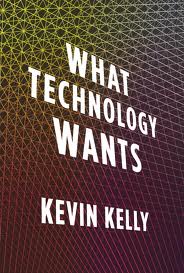
"What Technology Wants"
By Kevin Kelly
Penguin Books
http://kk.org/books/what-technology-wants/
This book introduces a brand-new view of technology. It suggests that technology as a whole is not just a jumble of wires and metal but a living, evolving organism that has its own unconscious needs and tendencies. Kelly looks out through the eyes of this global technological system to discover “what it wants.” Kelly uses vivid examples from the past to trace technology’s long course, and then follows a dozen trajectories of technology into the near future to project where technology is headed.
This new theory of technology offers three practical lessons: By listening to what technology wants we can better prepare ourselves and our children for the inevitable technologies to come. By adopting the principles of pro-action and engagement, we can steer technologies into their best roles. And by aligning ourselves with the long-term imperatives of this near-living system, we can capture its full gifts.
"What Technology Wants", talk by Kevin Kelly, Microsoft Research
http://msrvideo.vo.msecnd.net/rmcvideos/140924/dl/140924.mp4
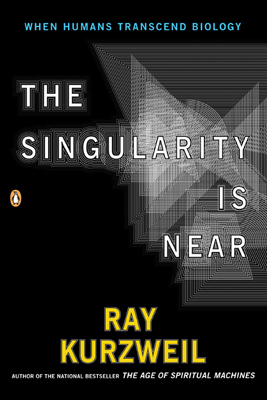
"The Singularity Is Near"
By Ray Kurzweil
Penguin Books
http://www.singularity.com/aboutthebook.html
For over three decades, the great inventor and futurist Ray Kurzweil has been one of the most respected and provocative advocates of the role of technology in our future. In his classic The Age of Spiritual Machines, he presented the daring argument that with the ever-accelerating rate of technological change, computers would rival the full range of human intelligence at its best. Now, in The Singularity Is Near, he examines the next step in this inexorable evolutionary process: the union of human and machine, in which the knowledge and skills embedded in our brains will be combined with the vastly greater capacity, speed, and knowledge-sharing ability of our own creations.
"How Technology Will Transform Us", talk by Ray Kurzweil, TED Talks
http://www.ted.com/talks/ray_kurzweil_on_how_technology_will_transform_us.html
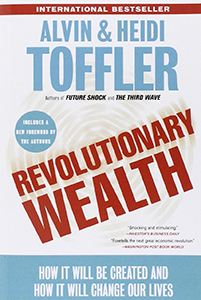
"Revolutionary Wealth"
By Alvin and Heidi Toffler
Crown Business
Revolutionary Wealth focuses on how wealth will be created—and who will get it—in the twenty-first century. As the knowledge-based economy continues to replace the industrial-based economy, money is no longer the sole determinate of wealth. The Tofflers explain that we are becoming a nation of “prosumers,” consuming what we ourselves produce, and argue that we have all taken on “third jobs”—work we unwittingly do without pay for some of the biggest corporations in the country. Using fascinating examples from our daily lives, they illustrate how our everyday activities—from parenting and volunteering to blogging, painting our houses, and improving our diets—contribute to a non-monetary economy that is largely hidden from economists.
"Revolutionary Wealth", interview with Alvin Toffler
http://fora.tv/2006/05/16/Alvin_Toffler#fullprogram

"Ages of Discord"
By Peter Turchin
Beresta Books
http://peterturchin.com/ages-of-discord/
Historical analysis shows that long spells of equitable prosperity and internal peace are succeeded by protracted periods of inequity, increasing misery, and political instability. These crisis periods—“Ages of Discord”—have recurred in societies throughout history. Modern Americans may be disconcerted to learn that the US right now has much in common with the Antebellum 1850s and, more surprisingly, with ancien régime France on the eve of the French Revolution. Ages of Discord marshals Structural-Demograpic Theory and detailed historical data to show that this is, indeed, the case.
How You Are Going To Die: Societal Collapse, 2019
http://peterturchin.com/videos/